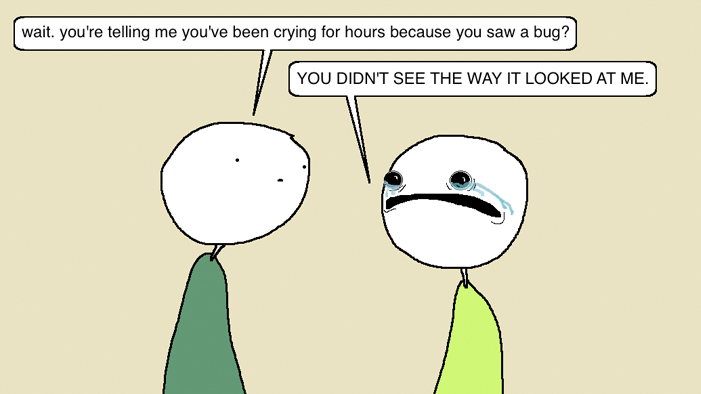Auntie SparkNotes: I’m Losing Patience with My Over-Sensitive Friend

Hi Auntie!
I’m having trouble being sympathetic and caring towards my friend.
My friend is someone who gets very stressed about studying and her university workload. She very often needs to rant and vent about how much work she has, how hard it is, how stressed she is, and generally how she is worse off than anyone else. She brings it up a lot. I want to be a good and sympathetic friend, especially as I know her anxiety intensifies her stressing.
However, as unkind as this sounds, I’ve been feeling more and more tired of her ranting, especially because it doesn’t seem like she has much to worry about. Despite her constant worrying about being behind in her work, she is top in her class. She doesn’t have any problems paying fees or trying to maintain a scholarship, and has a supportive family and group of friends.
Additionally, some of the things she gets so worked up about seem so minor and invalid to me. For example, she once told me she had the worst day and just wanted to get into bed and never come out. When I asked her what had happened, it turned out what was upsetting her so much (she cried a ridiculous amount) was that the librarian wouldn’t let her into the library with her coffee. I had to act supportive because she was distraught, but I was frustrated because I didn’t understand what the big deal was.
Sometimes I just want to shake her and tell her to pull herself together when she’s crying and panicking, and I was wondering if you have some practical advice on how I could have a bit more patience with her and be more helpful and kind.
Ooooh, but there—as a certain Shakespearean prince would say—is the rub. Because when it comes to being helpful, patience only goes so far—and darling, when you’re walking your friend through a sobbing breakdown over not being allowed to bring a latte into the library, it’s officially gone too far. There’s a difference between being sympathetic to a person’s struggles and validating her wildly disproportionate reactions to every minor setback. And a real friend will not only recognize the difference between the two, but draw the line at enabling the latter, which is both unhealthy and unhelpful in the scheme of things.
But that’s why, rather than looking for ways to stretch your dwindling supply of patience to accommodate your friend’s endless need for reassurance, I’m going to urge you to give her a gentle shove in the direction of getting her shizz together. You don’t have to literally beat her about the face and neck with a newspaper like Edna Mode (although if you wanted to, to be perfectly frank, I do not think anyone would blame you)—but the next time she begins ranting, venting, or weeping uncontrollably about some basic aspect of being at college, one of the following tactics might serve you:
Productive Validation
Tell her you understand she’s upset, but that you’re concerned to see her upset so often. And then (and this is the kicker), ask her what she intends to about it. Force her to think about her problems productively, instead of just complaining, and you’ll change the conversation.
Changing the Subject
If you’re at the limit of your patience (whether it’s because you’ve been listening to her rant for fifteen minutes or because she’s bringing up the same subject for the fifteenth time), then try this: “I’m sorry you’re so stressed out. I wish I had something more helpful to tell you. Anyway, what are you doing this weekend?”
Pushing Back
In the case of genuinely baffling stuff like the Great Coffee Catastrophe of 2017, it’s okay to point out the obvious: “I don’t mean to be unsympathetic, but I’m confused. You’re crying like this about… a coffee? Can you help me understand why this is such a big deal?” Obviously, this is a tough message to deliver—but it’s also arguably a kindness to give an overreactive loved one a friendly reality check, if only to preempt the likelihood of someone else giving her the kind that comes with an accessory newspaper beating.
If you change your approach in this way, you’ll be accomplishing several things. First, you’ll subvert your current role as a source of endless, unquestioning validation for your friend’s every teensy trauma; if all she wants is to rant about her lot in life to a passive audience, she’ll have to turn to someone else. And since you’re encouraging her to think about her problems in a more productive way, the hopeful result will be that she either takes some steps toward solving them or gets some perspective that lets her cope better.
But also, you’ll make yourself better able lend a sympathetic ear if a genuine crisis occurs. Changing your range of responses will give you more patience and more sympathy for any actual problems, since you won’t be wasting it all on talking her through panic attacks over insignificant setbacks. And while you might experience a few hiccups depending on your friend’s ability to recognize and respect boundaries, this approach should ultimately do a lot to keep you sane… which is good, because if this is how she’s acting after just half a semester, she’s going to be an absolute terror during finals week.
Got something to say? Tell us in the comments! And to get advice from Auntie, email her at advice@sparknotes.com.
Want more info about how this column works? Check out the Auntie SparkNotes FAQ.













